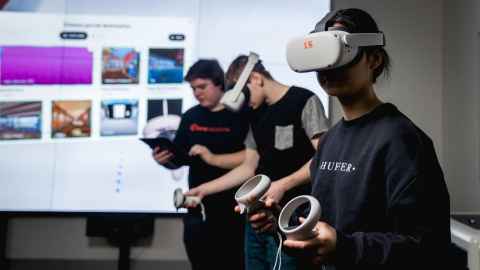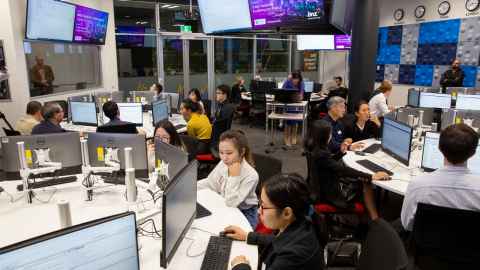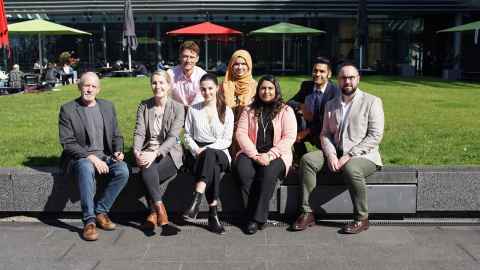Commerce students find fun in experiential learning with new Business School course
1 September 2022
Bachelor of Commerce students are developing the skills they need to succeed thanks to creative learning techniques in the new Business 202: Business Consulting course.

Virtual reality (VR) technology, immersive collaboration, and subjects with real-world relevance are all part of the appeal of Business 202, a new course that launched in Semester One this year for all second-year BCom students.
“I found that Business 202 was completely different from previous core commerce courses I had taken in my first year – this being 'different' in a good way,” says Regina Phu, who is part of the first ever cohort of students to undertake the course.
“I particularly appreciated and enjoyed the new structure this course brought forward, using new teaching methods and introducing creative assessments.”

Clare Yip is another student who enjoyed the new take on the typical course structure: “Rather than traditional lectures, essays, tests, and a final exam, we had interactive workshops and unique assignments unlike anything I had done in any other course before, making it a really interesting and engaging experience,” she says.
Business 202 is comprised of three modules: climate change, the future of work, and competing globally. Instead of traditional assessments, students complete a variety of hands-on exercises such as developing a LinkedIn page, engaging in multi-lateral climate negotiation and using Spatial.io, a collaborative VR platform where they can interact in the metaverse using 3D avatars.
“This new innovative way of learning undoubtedly made my semester more engaging, immersive and memorable.”
“It was a nice change from interacting on your typical audio call platforms!”
The course is the result of a months-long consultation process involving a diverse group of approximately 40 stakeholders from across the University and the wider industry. Dr Nina Brosius, course coordinator and Professional Teaching Fellow (Marketing), says the aim was to give students the tools they need to “pave their own way in their future careers”.
“Our main goal was to design and deliver an engaging, meaningful and inspiring course that focuses on grand business challenges of global importance.

“By getting students to critically, yet creatively, delve deeper into these global grand challenges, we aim to develop and enhance skills that are crucial in the real world of modern business: skills such as interpreting and presenting business information, ethical decision-making, teamwork, and project management.”
Commerce student Devanshi Ranjan found personal resonance in the subjects covered by Business 202, noting that climate change, the future of work and competing globally “are some of the topics that will most significantly affect us and future generations.”
“I see myself using the knowledge and skills I have learnt from this course in my future career by making more well-informed decisions based on a variety of factors, such as sustainability in marketing decisions,” she says.
For fellow student Brianna Chow, Business 202 has equipped her with the knowledge and vision of how she can be part of a force for good in her future career.
“Whether it be mapping out the many causes of climate change so we can backtrack and find a way to eliminate the sources, understanding the environmental, social, and governance elements of businesses to solve business challenges or understanding the new technological developments and how they can be effectively used to collaborate with people, it all comes together to make positive change.”